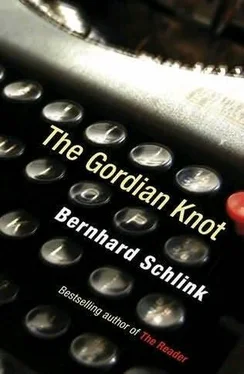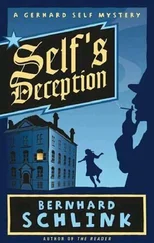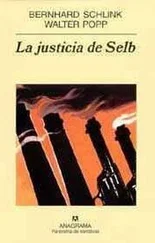“I will not repeat myself. Move it now.”
Georg again looked at the people sitting at the tables. He knew most of them, had chatted with many of them, played billiards or table-top football, had drunk Pernod with them. After two years in Cucuron, he felt that he belonged here, particularly now in summer when flocks of tourists were milling about the town. But he didn’t belong. There was spite in the faces, not just the indifference of not wanting to get involved. Georg got up and went over to his car. It was like running a gauntlet. He didn’t look for another parking spot, but drove home.
From that day on everyone’s behavior toward him changed: the baker, the butcher, the grocer, and the people he met in the post office, in the bar, and on the street. Or was he imagining things? The quick looking away that obviated the need to greet or be greeted, the slight hesitation of the baker’s wife from whom he bought a loaf of bread, the hint of condescension with which the café owner took his order. He couldn’t have proven any of this in court, but he felt it. What surprised him the least was that the branch manager of his bank asked him to step into his office. For months there had been a lot of activity in his account, and now there were no more deposits, only withdrawals. Needless to say, the bank had to check that everything was as it should be. As for his landlord-he had always been something of a psychopath. That he drove around his house every evening in his old Simca might have something to do with it. But now there were phone calls from the landlord’s wife, who had always been reasonable in the past. They were sorry, but their daughter was coming back from Marseille and wanted to move into Georg’s house. They would have to discuss terminating his four-year lease early.
Georg had nothing to say to any of this. All his strength, courage, and trust were gone. I’m an open wound, he thought.
There was nothing left with which he could ease his thoughts and longing for Françoise.
He was furious: I gave you my love and you took it, but for you it was only physical. You enjoyed our nights together as much as I did, gave yourself to me with as much abandon and pleasure as I gave myself to you. For me the passion I gave and took was a seal on our love, but for you it was only a passion each partner kindles and satisfies, a passion that doesn’t seal anything. If I could have been so wrong, if you could have deceived me like that, if such devotion cannot even act as a seal of love-what’s left for me to believe in? How am I supposed to ever love again? One silent reproach followed another. But even the most absurd accusations couldn’t bring her back. When someone leaves us, we accuse them so that they apologize and come back. In this way we are serious about the accusations, but are ready to agree to any conditions. Georg was aware of that.
He tried to be reasonable. The pain of separation is just a phantom pain, he told himself. How can something that no longer exists hurt me? Yet the slightest circumstance taught him that a phantom pain is not just phantom, but in fact real pain. He was sitting in the restaurant, had eaten well, was having a glass of Calvados and a cigarette, and suddenly imagined her sitting across from him, sighing contentedly, leaning back, and rubbing her tummy. He had always felt uncomfortable when she did this. But now, even this image stung. Or he found a long brown hair in the basin, which unleashed cascades of beautiful memories, though in the past, when he found a hair of hers in the basin, it had always irritated him.
He toyed with cynical quips that he found elegant or that sounded clever. One can’t end a relationship by splitting up. One must continue in the relationship and weave it into the tapestry of one’s life, or forget the relationship. Forgetting is the garbage dump of life. I’m throwing you into the garbage, Françoise!
None of that changed the fact that he missed her. When he woke up, sat down at the breakfast table, busied himself with the herb garden, and felt the empty house behind him; when he walked along the paths the two of them had walked; when-everyone has experienced something similar. He no longer had anything to do. He lived off the rest of the money that had come in so lavishly over the past few months. What he would do when it ran out, he didn’t know. He couldn’t think about that. He often sat all afternoon in the rocking chair, staring blankly at the trees.
IN SEPTEMBER AN OLD FRIEND FROM HEIDELBERG came to visit. The first evening they stayed up late, lit a fire in the fireplace after midnight, and opened a bottle of wine.
“Do you want to hear a crazy story?” Georg asked, and told him what had happened.
“I only saw Françoise that one time when you invited us all to your party,” his friend said. “Do you have any pictures of her?”
“I took a lot of pictures, but she either took them with her or they got lost when my place was ransacked. I only have one left.” He got up and went to find it. It was a picture of Françoise on a couch in her apartment, reading, her eyes downcast.
“Ah yes. By the way, what’s that picture on her wall?”
“It’s the cathedral in Warsaw where her parents were married.”
A short while later, Georg’s friend asked to see the photograph again.
“It isn’t a particularly good one,” Georg said. “She didn’t like being photographed, so I often took snapshots of her when she wasn’t looking. Though some of the pictures did turn out quite…”
“That’s not in Warsaw. I know that church. I can’t think of its name. It’s in New York.”
Georg looked at him in surprise. “Why would she have a picture from New York on her wall?”
“No idea. All I know is that it’s in New York, a cathedral they never finished that’s still under construction. St. John! That’s it! It’s enormous! I think it’s the biggest church in the world after St. Peter’s.”
“New York…” Georg shook his head.
Over the next few days Georg kept coming back to the subject. “Are you sure that the cathedral in the picture is in New York?”
“Well, perhaps Warsaw has the same one. In Wiesbaden there’s a cathedral that was built from Schinkel’s plans. Wiesbaden’s municipal architect had purchased the plans in Berlin, and there’s probably a church just like it somewhere in Berlin. But as for America, it’s a bit hard to imagine. The Americans would sooner have copied Chartres than Warsaw, and as for the Poles constructing their churches along American designs-you tell me if that makes sense.”
The evening before his friend left, Georg asked him if he knew anyone in New York who might put him up for a while.
“I’ll give it a try.”
“Please, it’s important.”
“You mean now?”
“I put in a call to a travel agent this morning,” Georg told him. “I’m flying next week from Brussels.”
“For how long?”
“Until I find her.”
“It’s a big city,” his friend said dubiously.
“I know. I also know that Françoise could be anywhere in the world. But why did she lie about the picture?”
“You don’t know where she got it. Maybe she herself didn’t know where it was from.”
Georg looked at him irritated. “You’ve seen for yourself the kind of life I’m leading. What am I supposed to do here? I’d rather take the money I still have and… I don’t know how I’ll look for her, but I’ll think of something.”
After his friend had left, Georg sold what he could sell, and threw away whatever didn’t fit in his car and nobody wanted.
A week later he gave the landlord the keys to his empty house.
Читать дальше












